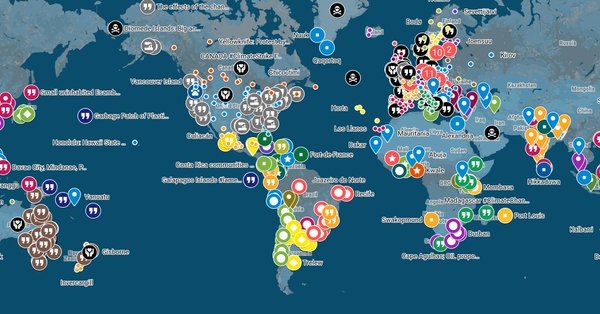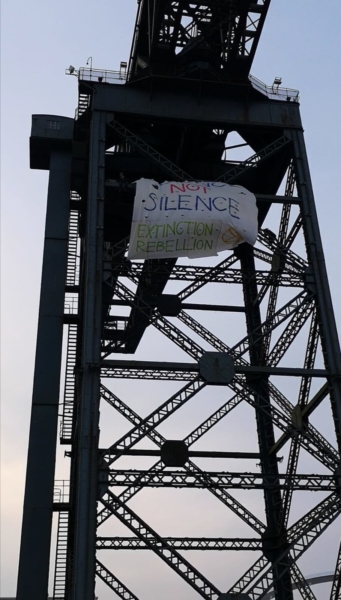Go After the Whaler not the Whale: XR and Climate Action


What Extinction Rebellion has shown is that fear is a far more potent motivator than hope. They have been completely honest about the fact that we are about enter a series of feedback loops that will quite possibly lead to human extinction, that in fact we may have already passed the point of no return. Instead of turning people away, however, they have grown exponentially.
Between hope and hopelessness there is a vein of mercury. People become more passionate about solving a problem the more dangerous they understand that problem to be. When you think about it, this is kind of obvious, and it is somewhat surprising that it took us so long to realise this. The reason for that, I would argue, is another long-standing problem in the environmental movement.
This is the constant, unending mantra of individual action.
Whether individual action is something that was purposefully cultivated by powers threatened by the environmental movement, or whether it is simply the result of us all existing within a system that effects the way we think, there could not be an environmentalism more beneficial to the capitalist machine. It moves the onus of stopping environmental collapse entirely onto the worker. This is roughly as useful an approach as trying to save the whales by individually changing the behaviour of each whale. There are two basic reasons that the call to individual action is so objectionable:


Let’s try to imagine a scenario in which individual action could stop, or even meaningfully impact, climate change. Of course, if we convinced everybody then we would be sorted, since everybody includes Jeff Bezos and Donald Trump.
We recognise that there is a category marked people who will never change their behaviour. There are more than two members of this category. The category is made up of:
• people who believe the wealth they are currently extracting via environmental destruction is more beneficial than the long-term health of the planet
• people who will never be convinced of the existence of anthropogenic climate change, no matter how strong the evidence that is presented to them
• people who cannot afford to commit to the fairly expensive lifestyle many western environmentalists model
• people who do not think that their own impact will be significant enough to be worth the personal cost to them of changing the way they live
It’s hard to say what percentage of the population falls into at least one of these groups. Let’s be extremely generous and say fifty percent.
What would happen if, through the greatest public information campaign in history, we convinced an entire half of the population to radically change their lives? Since we have both the highest emitters and the lowest emitters in our ‘will never change’ category then we can fudge the numbers a bit and say that this will cut carbon emissions in half. Then let’s fudge the science (make like the IPCC and ignore feedback loops) and say that this doubles the time we have before it is too late to halt the problem, giving us about an extra ten years. This is obviously extremely helpful, although far from any kind of an actual solution. But you’ll note that up until this point I’ve been assigning ‘convinced people’ a carbon footprint of zero, which is, of course, ludicrously optimistic. What would it take to lower one’s carbon footprint to zero?
To take just one example, the change required to go zero carbon in our diets will be much greater than simply going vegan.
At present the UK does not produce enough to feed itself, so as climate-concerned people begin to rely exclusively on domestic food, the unconcerned will start to eat more food from abroad, and so balance it out. Of course, domestic food is still not enough, moving food around the UK still produces a large amount of carbon. In order to survive, the climate-concerned will have to move to agrarian parts of the country to be nearer the food supply. This will unfortunately require the building of many new houses which, once again, is a huge source of carbon, and in any case heating and maintaining a house is pretty bad too, better we all try to live in lower impact housing like shacks or tents. At this point though, even without using electricity, plumbing or ever catching a bus, we are still contributing to carbon emissions, because the taxes we are paying are funding a government and a military that is far from carbon neutral. So now we must stop paying our taxes, and now we are involved in direct action against the government after all, even though we were trying to find another way. And we have to convince half of the population to do this.
Obviously this scenario is imagining that capitalism would not react to this huge shift in behaviour. In reality, all the big companies would be only too happy to sell us extremely eco-friendly products and then spend the money improving their fracking techniques. Or even, crazy as it might seem, they could lie to us about what was actually involved in the making of a product. Fudge the numbers. Find loopholes in international standards. Capital does what it must to survive.
2. Whales don’t like feeling guilty.
When environmentalists say that scaring people makes them less likely to act, what they are seeing is less the effect of fear and more the effect of all-consuming guilt.
Individual action is so built into our culture as the way to deal with environmental problems that, even if it is not specifically called for, it is what we assume is being asked of us. This means that confronting the threat of climate change seems to require that we take personal responsibility for it.
This is an extremely difficult thing for a person to do. They have to see all the inevitable suffering to come, all suffering already inflicted, and say, ‘I did this, through my inaction I am responsible’. And the thing is they’re not. They just simply are not.
They are victims of a system they did not create and which never asked for their permission. They are forced by structural and societal pressures into behaviours that the system continually reinforces as the only acceptable way to live, and they are punished for trying to disengage from it.
What’s more, the tiny changes they would be likely to make if they did accept all this (carpooling, being more careful about their recycling, remembering their bag for life, etc) is all utterly meaningless when compared to the actual emitters: the corporations and the governments.
The effect of this guilt is palpable, it turns people away from the movement and causes psychological turmoil for those within it.
What Extinction Rebellion offers is a response that finally matches the terrifying scale of the problem we are facing. It is an approach that goes after the whalers of the climate crisis, confronting them head on through direct action they cannot ignore. It is vital that any and all who care about the future of human civilisation and the global ecosystem head to London or Edinburgh today and take part in the most important movement in human history.
London: UK Rebellion – Shut Down London! April 15 onwards: https://rebellion.earth/event/uk-rebellion-shut-down-london/
Edinburgh: Day #1 – Festival of Climate Reality: https://www.facebook.com/events/2108503329440590/
Edinburgh: Day #2 – Climate Emergency Road Block https://www.facebook.com/events/168897767334993/

Bottom line is that people do not care.
Take plastic. It is unbiquitous. We throw away untold amounts of it with much of it disposed of carelessly into the environment. But do we really care or change our behaviour. Of course not. It took a financial penalty where we had to pay a levy on disposable bags before we made even the smallest attempt to change our useage of one of poly bags. But that is a drop in the ocean – literally.
Yes we can blame Big Plastic, a sister of Big Oil for the ubiquitous supply of plastic. But we as consumers have choice and we don’t excercise it. Governments could regulate for sustainable packagings, we as consumers could demand it but we dont. But the production, use and disposal of plastic is only one small part of the current planetary unsustainability. The Climate Change protestors are on the right track but at the end of the day, humankind is parasitic and parasites usually kill the host environment on which they feed.
And so unless or until there is natural disaster after natural disaster, or a huge reduction in the consumptive population, which means us, nothing will change. It is maybe the way of nature.
In the meantime, protests well intentioned as they are, will I’m afraid fail to stop the natural holocaust headed our way.
Just a technical point, Willie. Most parasites do not wipe out the species on which they depend. That doesn’t make sense from an evolutionary perspective. Malignant cancer might be a better metaphor, but I don’t think this is at all helpful. The fact is that many indigenous cultures lived/live sustainably. (Please note that I am not saying that all indigenous cultures were/are perfect/wonderful.) I found this to be particularly interesting: https://www.sapiens.org/culture/hunter-gatherer-inequality-namibia/ .
‘…If a society is judged by its endurance over time, then this was almost certainly the most successful society in human history—and by a considerable margin. New genomic analyses suggest that the Ju/’hoansi and their ancestors lived continuously in southern Africa from soon after modern H. sapiens settled there, most likely around 200,000 years ago. Recent archaeological finds across southern Africa also indicate that key elements of the Ju/’hoansi’s material culture extend back at least 70,000 years and possibly long before. As importantly, genome mutation-rate analyses suggest that the broader population group from which the Ju/’hoansi descended, the Khoisan, were not only the largest population of H. sapiens, but also did not suffer population declines to the same extent as other populations over the past 100,000 years.’
The real cancer is not ‘humankind’, but capitalism, of which the ‘neoliberalism’ meme is an especially malignant variant.
Events taking place on the 15th and 16th – article published on 15 th ! If you want participation you need to give adequate warning of events .
This was a comment piece about an imminent action – ER had been promoting these events for some time advance. While Bella’s is in entirely in support of action against climate breakdown its not our responsibility to promote specific actions.
Building new houses does not need to a source of carbon. We know how to build timber homes that are carbon positive and are virtually carbon zero to maintain.
Quite right Roland – eco house build is one area where we have huge gains, and if we were clever we could also decentralise alot of energy as a default practice.
They have spent the whole day on 5 live discussing the whole range of climate change issues, from breakfast time until now. ER is having an effect!